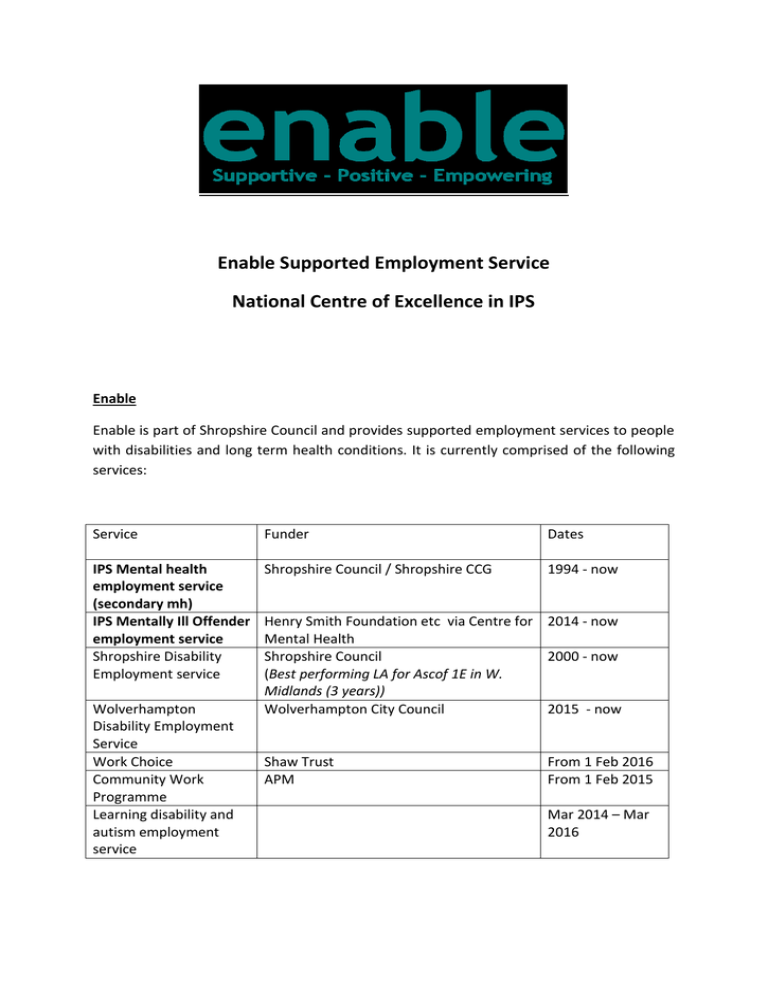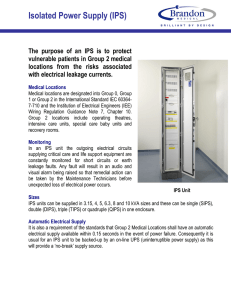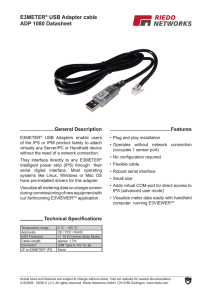Enable Supported Employment Service National Centre of
advertisement

Enable Supported Employment Service National Centre of Excellence in IPS Enable Enable is part of Shropshire Council and provides supported employment services to people with disabilities and long term health conditions. It is currently comprised of the following services: Service Funder Dates IPS Mental health employment service (secondary mh) IPS Mentally Ill Offender employment service Shropshire Disability Employment service Shropshire Council / Shropshire CCG 1994 - now Wolverhampton Disability Employment Service Work Choice Community Work Programme Learning disability and autism employment service Henry Smith Foundation etc via Centre for 2014 - now Mental Health Shropshire Council 2000 - now (Best performing LA for Ascof 1E in W. Midlands (3 years)) Wolverhampton City Council 2015 - now Shaw Trust APM From 1 Feb 2016 From 1 Feb 2015 Mar 2014 – Mar 2016 Enable and IPS mental health employment services Enable has been successfully delivering mental health employment services for people in secondary services for over 20 years. Since 2009 it has been part of the Centre for Mental Health’s Centre of Excellence in IPS Programme: it was amongst the first in the UK to have IPS training and the first service in the UK to have an IPS Fidelity Review. It has also successfully delivered the following mental health employment projects: The Improve Project 2011 to 2012: successfully trained and mentored mental health employment services in the West Midlands in the methodology and practice of IPS in order to raise employment outcomes. Employment outcomes improved in most areas as a result. National IPS in IAPT Pilot Jun – Dec 2014: Enable was one of 4 national sites to provide an IPS employment service to IAPT customers in Shropshire and Telford. This was a joint DWP / DoH project. After initial difficulties, Enable had a good number of referrals and had the highest number of outcomes from the 4 sites. IPS in IAPT Project Jan 2015 – Dec 2015: this was funded through the DWP Flexible Support Fund and followed on from the national Pilot. Referrals were taken from both IAPT therapists and DWP work coaches. In only 12 months 1.5 FTE staff supported 36 people into work. Outcomes Shropshire Mental Health Employment Team Outcomes (secondary services): Year Jan – Dec 2014 Jan – Dec 2015 Target 51 51 Outcomes 69 66 % 135 129 DWP & DoH National IPS in IAPT Pilot (primary services): Project date: Jun – Dec 2014 Target N/A Outcomes 10 % N/A Outcomes 36 % 120 Outcomes 12 19 % N/A N/A DWP IPS in IAPT Project (primary services): Project date: Jan – Dec 2015 Target 30 Centre for Mental Health Offenders Project: Year Jan – Dec 2014 Jan – Dec 2015 Target N/A N/A IPS in Practice Why it works so well: Joint working between employment specialists and mental health specialists: Employment promotes recovery; working together to achieve this aim makes sense. Being embedded with the mental health team allows for an enhanced level of collaboration. There may be barriers to employment that it would be difficult for an employment specialist to overcome without the expertise and support of the mental health professionals. Good job matching: Finding a good job match is a key part of IPS; a job role that is based on a client’s skills and preferences and that suits their individual set of circumstances. Small Caseloads: The maximum caseload for a full-time IPS employment specialist is 20. This means that workers have the ability and the flexibility to be able to adapt their approach to suit the needs of each client and to really get to know the people that they are supporting. Focus on real paid work from the outset: We aim to have begun making links with employers within 4 weeks of meeting an individual. We only support people into paid work, not voluntary work. High level of employer engagement: Each employment specialist gets to know their patch really well and is creative in their job searching. Rather than only applying for advertised roles, the IPS employment specialist uses a variety of methods to meet with employers to discuss potential job opportunities that suit both the needs of the client and the employer. Ongoing, time-unlimited support: Support does not end once the individual gains employment. Support is ongoing for as long as the individual wants it. Starting a new job can be a particularly stressful experience and the employment specialist draws up a comprehensive in work support plan to ensure that the right support is in place. Due to the often fluctuating nature of many mental health conditions, it is important that the employment specialist is on hand to support as and when the low points occur and to help the individual to retain their job. Challenges: Short-term funding does not allow for time-unlimited support: This has been particularly challenging with regard to the 2 IPS in IAPT services that Enable has recently delivered (one a 6 month pilot and one funded for a year). Changes in mental health services: IPS works best where there is collaborative working with joint goals between the mental health professionals and the employment specialists. With increasing pressure on mental health services to discharge patients as soon as possible, the opportunities for collaborative working are greatly reduced. The timing of referrals is key here. Restrictions applied due to the funding source can be at odds with IPS principles: for example with the DWP funded IPS / IAPT service there were many referrals that we were unable to take due to the fact that the individuals were not in receipt of the correct DWP benefits. This does not fit with the zero exclusion principle of the IPS Model, the only qualifying criteria for an IPS service is that the individual wants paid work. Jonathan Allan, Disability Services Manager jonathan.allan@shropshire.gov.uk Ruth Davies, Senior Employment Officer ruth.davies@shropshire.gov.uk Enable 01743 276900 Example Case Study – Stephen The referral: Stephen was referred to Enable by his Occupational Therapist at the Community Mental Health Team. At the time he had a diagnosis of Asperger Syndrome combined with Depression and Anxiety and Stress as a result of his diagnosis. He had been out of work for over five years. The main barriers that SB faced in terms of finding employment were: the communication difficulties associated with his diagnosis of Asperger Syndrome the length of time without employment the terms on which he had left his last paid employment his financial situation – how to be better off in work. Preparing for Employment: The first thing that Stephen and I did together was to attend an appointment with the Disability Employment Advisor at the job centre, to get a Better off in Work Calculation. This allowed us to work out what hours would suit him best. We discussed in detail the issue of disclosure, the pros and cons of telling an employer about his mental health and what Stephen would be happy for an employer to know. Putting together a CV we were able to draw attention away from the length of time that Stephen had been unemployed, by focusing on and describing the skills and experience gained from voluntary and social activities carried out during this period. Targeting Employers: Together Stephen and I agreed which employers he wanted to target and we did a combination of CV drops (where we walked around the town centre together calling in on employers and enquiring about vacancies) and cold calling where I would ring employers, describe the skills and qualities that Stephen would bring to their organisation with the aim of arranging a meeting. This was a successful tactic and Stephen had a string of interviews including: Curry’s, Argos, NISA and Spar. None of these interviews were successful usually due to Stephen’s communication difficulties. We decided to approach the Bowling Alley as Stephen spends a lot of his spare time there and is well known to the staff team. As he knew Stephen well and understood some of his communication issues, I was able to negotiate a work trial with the manager, instead of a more traditional interview. Offer of Employment: The work trial went well and Stephen was offered a job. I went in to meet with the manager to explain the importance of Stephen doing a set number of hours a week, to protect his benefits and also to describe the types of support that would really benefit him. We agreed to meet every 6 weeks to review progress. On-going Support: Stephen has now been working at the Bowling Alley for over a year and has won an employee recognition award and scored 100% with the Mystery Shopper. There have been three changes in manager during this time, but with the right support Stephen has coped well with these changes. I continue to work closely with Steven, his employer, his care co-coordinator, his appointee and his father.



